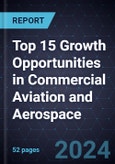Emerging Technologies Play a Pivotal Role in Propelling Advancements in the Aviation and Aerospace Sector
Globally, the commercial aviation industry emphasizes sustainability, with aircraft OEMs focusing more on developing energy-efficient aircraft. They also aim to increase electrification on aircraft and make them compatible with sustainable aviation fuel.
In the commercial aircraft manufacturing market, the barrier to entry is high due to the substantial investment to develop aircraft. Sustainability provides startups an opportunity to work on new technologies, such as using hydrogen as fuel and developing electric vertical takeoff and landing (EVTOL) aircraft. While these startups can secure orders from airlines, obtaining certification from aviation regulators can be time-consuming and capital-intensive.
In the next 10 years, urban air mobility is expected to become a reality, especially in developed economies. This will unveil a new subsector within the commercial aerospace industry where the design, development, and aftermarket of the EVTOL will differ from traditional jet engine-based aircraft.
The commercial aerospace industry is also leveraging the benefits of additive manufacturing to develop aftermarket parts. Refinement in additive manufacturing technologies will boost adoption in the next 5 to 10 years. The commercial unmanned market has witnessed unprecedented growth in recent years, driven by technology advancements and diverse use cases. The most important segments are those demonstrating strong demand for new technologies and where drone systems are achieving significant improvements.
Sustainability will continue to drive the evolution of this market in 2024 as drones are increasingly adopted to reduce carbon emissions across several sectors. Security concerns arising from the use of conventional drones in warfare will encourage governments and security agencies to invest in counter-drone technology to prevent the harmful use of drones against civilians.
The segments associated with logistics are most likely to benefit from these factors. Gaining ground during the pandemic, last-mile drone deliveries are forecast to expand to new markets as regulations ease and technology advancements enable longer flying times and safer delivery methods. The development of complex heavy-lift drones will also benefit this segment, as standard drone deliveries are limited to light packages due to the heavy weight of its components and weak propulsion systems.
Autonomous features in drone systems will also be important in 2024. Rising labor costs, especially those associated with drone pilots, represent a major challenge for companies adopting these systems, particularly in the infrastructure inspection segment. To address this concern, drone OEMs incorporate autonomous features into their products to make adoption smoother, so workers with little drone experience can fully leverage this technology. Companies also develop comprehensive drone-in-a-box solutions capable of collecting and processing data with little to no operator input, streamlining workflows, and drastically reducing the training required to use this technology.
Table of Contents
Strategic Imperatives
Top 15 Growth Opportunities
- Growth Opportunity 1: Big Data Platforms for Improved Operations and Merchandising
- Growth Opportunity 2: Hydrogen Combustion Turbine Development for Better Performance Characteristics
- Growth Opportunity 3: More Electric Aircraft for Improved Energy Efficiency
- Growth Opportunity 4: Electric Ground Support Equipment to Reduce Carbon Emissions
- Growth Opportunity 5: Utilizing Sustainable Aviation Fuel to Reduce Carbon Footprint
- Growth Opportunity 6: Large-scale Biometric Implementation for Faster Passenger Processing at Airports
- Growth Opportunity 7: Total Airport Management for Optimal Efficiency
- Growth Opportunity 8: Blockchain Technology for Aircraft Parts and Component Status Monitoring
- Growth Opportunity 9: Additive Manufacturing in the MRO Sector for Reducing Delays in Sourcing Critical Parts
- Growth Opportunity 10: Installation of Remote Towers to Manage Small Airport Clusters
- Growth Opportunity 11: Last-mile Delivery
- Growth Opportunity 12: Emission Monitoring
- Growth Opportunity 13: Drones for Infrastructure Inspection
- Growth Opportunity 14: Drone-in-a-Box Solutions
- Growth Opportunity 15: Heavy-lift Drones
Next Steps








